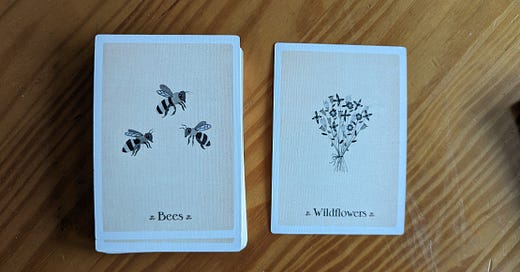Wabi-Sabi: Unfinished things can be beautiful
At least, that's what I'm telling myself until I'm finished.
Last week, I was vacuuming under the bed when I noticed something familiar: a small scrap of brown fabric. It was covered in dust and hidden underneath an old guitar case, but as soon as I saw the light brown fabric, I knew exactly what it was. One of Murphy’s old dog booties. I stared at it for a moment, and then I couldn’t help myself…I took a little whiff. It still had that stinky dog odor. Like corn chips.
Yes, it was a little gross, but my olfactory memory immediately kicked in. It was like she was right there in the room with me. I remembered scratching her bony little head. Rubbing the tender spot on her ear. I could almost feel her lean her head into the scratch. It’s been almost two years since we said goodbye to Murphy. Finding that sock was a sad but beautiful treat. It gave me a chance to relive my time with her, even for a moment. And even if that moment involved sniffing a stinky old sock.
Wabi-Sabi (Japanese)
Not long ago, I was feeling sorry for myself about a book project I’d been working on for years. Seeking some guidance—and, okay, maybe to procrastinate—I called my brother. He’s an artist with a very creative mind.
He said he once worked on a project for years, too. It was an oil painting and the canvas was really big. At the time, he lived in a small apartment, which meant there wasn’t much space to store it. So the canvas sat against his living room wall, right next to the TV. Some days he would pick it up and work on it; other days he’d stare at it and do something else. It took him eight years to finish it.
The great thing about being a writer is that you can shove your unfinished project in a drawer where you never have to look at it again. It’s not staring you down while you watch reruns of The Office. (Of course, this also makes it easy to forget about your project entirely.) It would drive me crazy to face my unfinished project every day, so I asked my brother how he learned to slow down and enjoy the process of creating art. “Oh, I didn’t say I enjoyed it,” he told me. “I felt bad about myself every day!” We laughed. When I feel bad about my unfinished projects these days, I think about that conversation and how sometimes discomfort is part of the process. But the funny thing is, I remember walking into my brother’s apartment in those days and seeing his canvases leaning against the wall. To him, they were unfinished projects. But to me, they looked cool. They were a reminder of his artistic skill and an expression of his creativity. Despite their unfinished state, or maybe because of their unfinished state, they were beautiful.
The Japanese phrase wabi-sabi springs to mind. It’s a concept that celebrates imperfection, impermanence, and incompleteness. In the words of Japanese architect Tadao Ando, wabi embodies simplicity and humility, while sabi speaks to the beauty of aging, or the “bloom of time." It’s been described as two different aesthetic experiences being merged: subtle simplicity with natural imperfection. “If an object or expression can bring about, within us, a sense of serene melancholy and a spiritual longing, then that object could be said to be wabi-sabi,” one author wrote. Melancholy and longing? Yep, sounds like the experience of an unfinished project to me.
Finishing a project is undeniably satisfying —that’s the goal, right?—but wabi-sabi is a reminder that there’s a unique kind of beauty in its unfinished state—a canvas alive with possibility, a story waiting to be told. The writer Natalie Goldberg describes the process of writing as composting, where we allow our thoughts, experiences, and curiosities the time to create a fertile soil that will nourish our creative expression.
Over time, I've come to embrace my own unfinished projects this way: as a reminder that there’s beauty in the “in-between” state. They are simple and incomplete, and I can relish the work even while it’s in progress.
At least, that’s what I’m telling myself until I’m finished.
From the archives
How to Find Joy in Unfinished Projects
Share-worthy
Speaking of unfinished projects, I loved talking to BBC Radio 4 about the beauty in the unfinished, from the Sagrada Familia to The Beach Boys’ legendary Smile album.
A friend forwarded me this McSweeney’s essay: Feelings and Situations for Which There Should Be a German Word Without an English Equivalent.
Anna Goldfarb’s new book, Modern Friendship, is out this week! It’s fascinating and chock-full of advice to make your friendships stronger. Buy it for your BFF.
— Kristin





Wabi-sabi is such a delicate concept. I've often heard it in relation to the artistic technique of fixing broken things (eg: ceramics) with gold. Creating beautifully unique 'mistakes' that are not mistakes at all !
thank you - that helped.... as I am just in the seventh year of my draft novel :-)